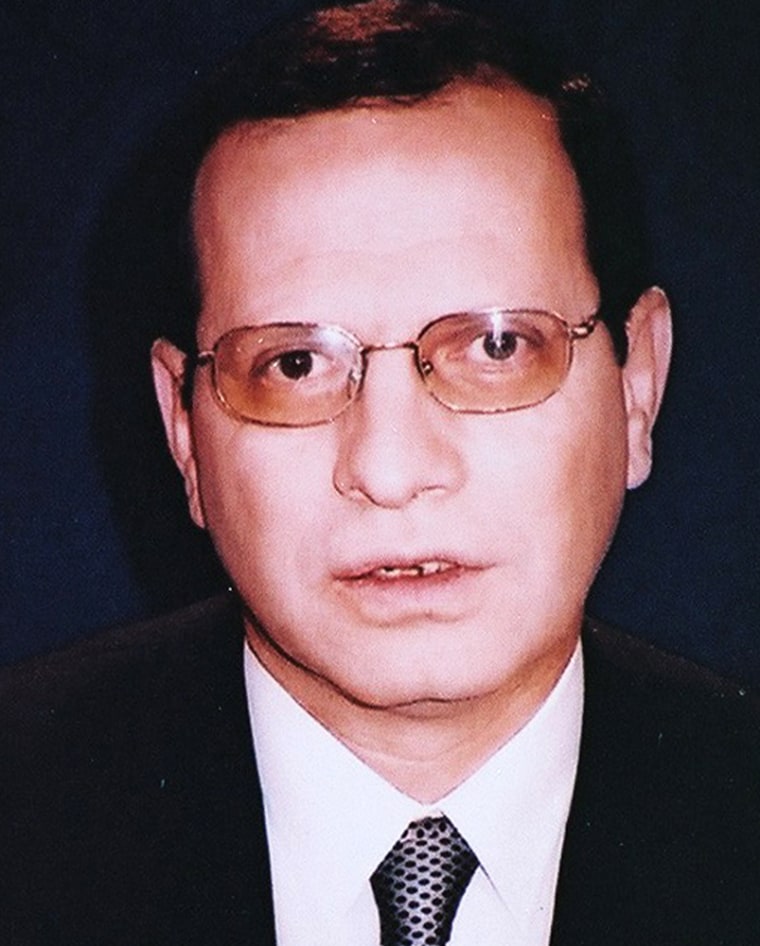Al-Qaida in Iraq said in a Web posting Thursday that it had killed Egypt's top envoy in Iraq, showing a video of the blindfolded diplomat identifying himself. The video did not show his death.
A statement purportedly from al-Qaida said it delayed claiming responsibility for the Saturday abduction of Ihab al-Sherif "to be able to capture as many ambassadors as we can."
The claim of responsibility was posted Tuesday following kidnap attempts against top diplomats from Pakistan and Bahrain in a campaign to isolate Iraq's U.S.-backed government in the Arab and Muslim world.
"We announce in the name of al-Qaida in Iraq that the verdict of God against the ambassador of the infidels, the ambassador of Egypt, has been carried out. Thank God," a written statement in the Web posting said.
The video showed al-Sherif blindfolded and wearing a polo shirt. He identified himself as the head of Egypt's mission in Iraq and said he worked previously in Israel, where Egypt maintains an embassy. Al-Sherif was deputy Egyptian ambassador in Israel from 1999-2003.
However, the tape did not show al-Sherif's death. Previous al-Qaida in Iraq tapes did show hooded men butchering their captives.
A step backward for Iraqi relations?
If the claim to have assassinated al-Sherif is true, it would mark a dramatic escalation in a campaign to discourage Arab and Muslim governments from sending ambassadors and strengthening ties with Iraq, as Washington wants. Iraqi officials have called on other countries to stay the course and keep their diplomats in Baghdad.
"I don't think what happened will discourage others to open embassies in Iraq considering the security guarantees by the Iraqi government," Jawad al-Maliki, chairman of the parliamentary security committee, told Al-Arabiya television. "Syria for example is willing to open embassy in Iraq and Tehran. Jordan also is serious with this matter."
Laith Kubba, spokesman for Prime Minister Ibrahim al-Jaafari, referred to explosions against transport facilities in London on Thursday, adding this "confirms that terrorism in not only targeting Iraqis but everyone."
Al-Sherif, 51, was seized in a western Baghdad neighborhood as he stopped to buy a newspaper, witnesses said. He was not accompanied by any security.
Elsewhere, Iraq's president called for national unity Thursday as mortar attacks killed six civilians and injured 24 in the northern city of Mosul. Police opened fire on demonstrators in Saddam Hussein's hometown, Tikrit, wounding four.
President Jalal Talabani addressed hundreds of Shiite clerics Thursday at a constitutional conference in the Shiite holy city of Najaf, about 100 miles south of Baghdad.
"Drafting the constitution, God-willing, will be done on schedule and I am confident about cooperation" between Shiite and Kurdish legislators to do the job, Talabani said.
Talabani, a longtime Kurdish leader, added that all Iraqis will participate in drafting the constitution including representatives from the Sunni Arab community, whose members boycotted January's general elections and now make up the core of violent insurgency.
A parliamentary committee writing Iraq's new charter should finish the draft by Aug. 15 so it can be ready for a referendum two months later. A new constitution must be ratified before elections in December.
Nearly 1,700 suspected insurgents detained
In Baghdad, Interior Minister Bayan Jabr said Thursday that nearly 1,700 suspected insurgents have been detained and 41 killed in skirmishes during the six-week long Operation Lightning in the capital. About 1,000 terror suspects remain in custody, including four Sudanese, three Palestinians, two Egyptians, two Jordanians and one Syrian, he said.
Operation Lightning also uncovered a plot by eight police officers to bomb an Interior Ministry building that houses a police commando brigade, Jabr told reporters. The group included eight officers — three of them lieutenant colonels.
Mortar attacks aimed at a police station killed four civilians and wounded up to 46 more after striking surrounding streets in Mosul, the U.S. military said.
In Tikrit, police opened fire on 1,000 demonstrators Thursday at the seat of the provincial government as they were protesting the killing of the local council's head official, authorities said. At least four were wounded.
Protesters demand officials resign
The protesters demanded the resignation of the deputy governor and police chief because they believe their clan was responsible for Wednesday's killing of Ali Ghalib Ibrahim, who belongs to a rival clan, Mayor Wael Ibrahim Ali said.
Ibrahim, who headed Salahuddin's provincial council, was killed while driving in Tikrit, the province's capital, 80 miles north of Baghdad.
"He was fighting the corruption in the city council and that's why they assassinated him," Ali said during the demonstration.
Police guarding the provincial government building first fired warning shots into the air followed by volleys into the crowd, police Lt. Khudhir Ali said. The four wounded including a policemen, but it was not clear how he was shot, he said.
Separately, five decapitated bodies were found Thursday were found on the road between Rawah and Ramadi in northwestern Iraq, police said. The bodies police Maj. Hashim Mohammed said.
More than 1,465 people have been killed in insurgent attacks since Prime Minister Ibrahim al-Jaafari announced his new Shiite-led government on April 28.
